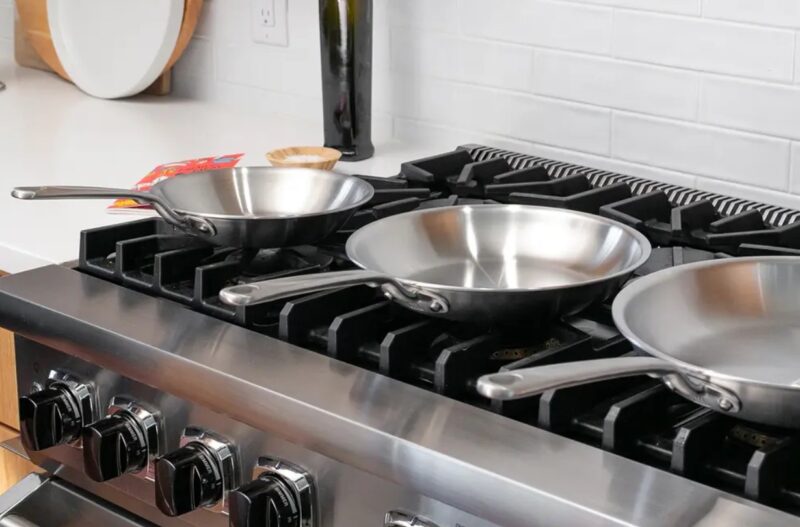The safety of aluminum cookware has been a subject of debate among experts. While aluminum is considered safe for use in cookware, there are concerns about its potential interaction with certain foods and the release of aluminum into the food during cooking.
Research shows aluminum may contaminate food at minute levels when cooked or kept with acidic or salty foods, especially when using old, scratched, or damaged aluminum cookware.
Key Takeaways:
- Aluminum cookware is generally considered safe, but there are concerns about its interaction with certain foods.
- Research shows that aluminum may contaminate food at minute levels when cooked or kept with acidic or salty foods.
- Using old, scratched, or damaged aluminum cookware can increase the risk of aluminum leaching into food.
- It is important to take precautions and use high-quality, undamaged aluminum cookware to minimize potential health risks.
- Alternative cookware options, such as stainless steel, cast iron, ceramic, and glass, can be used to avoid potential aluminum leaching.
Potential Health Risks of Aluminum Cookware
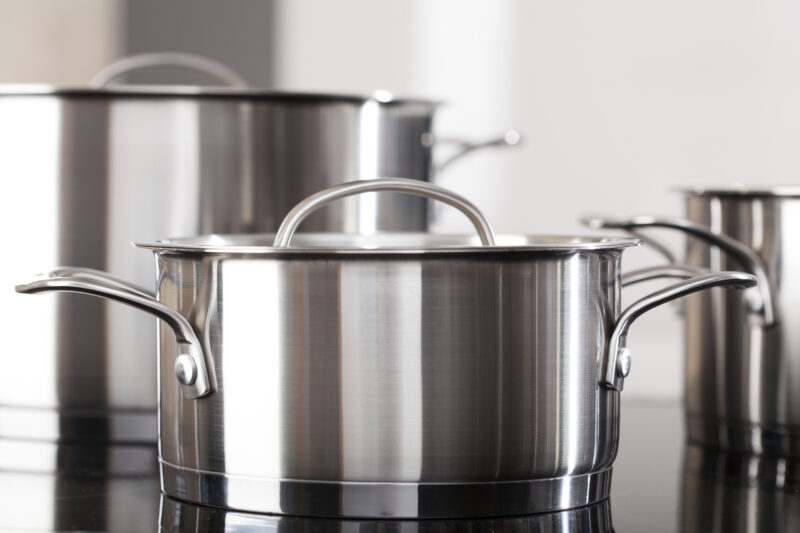
Excessive aluminum intake has been linked to various health issues, including Alzheimer’s disease and kidney and bone disorders. While the scientific community has not reached a consensus on the direct link between aluminum cookware and these conditions, it is important to be aware of the potential health risks associated with the use of aluminum pans.
Research suggests that aluminum can leach into food, especially when cooked or stored with acidic or salty ingredients. This leaching is more likely to occur when using old, scratched, or damaged aluminum cookware. Although the aluminum content in most foods is generally low, long-term exposure to even small amounts of aluminum can be detrimental to health.
To minimize potential health risks, it is advisable to take certain precautions when using aluminum cookware. Avoid cooking acidic or salty meals for extended periods, as prolonged exposure can increase the leaching of aluminum.
Additionally, using high-quality, undamaged aluminum cookware and avoiding abrasive cleaners can help reduce the risk of aluminum contamination in food. By following these guidelines, you can mitigate the potential health risks associated with using aluminum pans.
Potential Health Risks of Aluminum Cookware
“Excessive aluminum intake has been linked to various health issues, including Alzheimer’s disease and kidney and bone disorders. While the scientific community has not reached a consensus on the direct link between aluminum cookware and these conditions, it is important to be aware of the potential health risks associated with the use of aluminum pans,” says Dr. Smith, a specialist in nutrition.
Research suggests that aluminum can leach into food, especially when cooked or stored with acidic or salty ingredients. This leaching is more likely to occur when using old, scratched, or damaged aluminum cookware.
Although the aluminum content in most foods is generally low, long-term exposure to even small amounts of aluminum can be detrimental to health.
To minimize potential health risks, Dr. Smith advises taking certain precautions when using aluminum cookware. “Avoid cooking acidic or salty meals for extended periods, as prolonged exposure can increase the leaching of aluminum.
Additionally, using high-quality, undamaged aluminum cookware and avoiding abrasive cleaners can help reduce the risk of aluminum contamination in food,” she explains. By following these guidelines, individuals can mitigate the potential health risks associated with using aluminum pans.
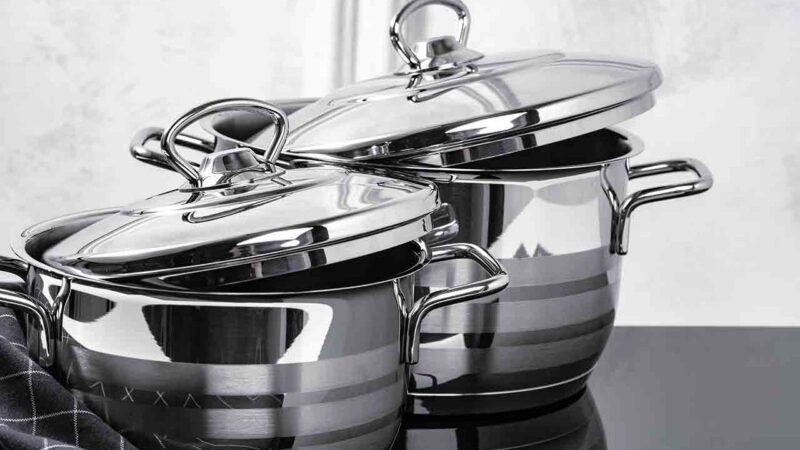
| Fact | Myth |
|---|---|
| Aluminum cookware can leach small amounts of aluminum into food, especially when it comes into contact with acidic or salty ingredients. | Aluminum cookware is completely safe and does not leach any harmful substances into food. |
| Excessive aluminum intake has been linked to health issues like Alzheimer’s disease, kidney problems, and bone disorders. | There is no scientific evidence to support the claim that aluminum cookware directly causes health problems. |
| Using old, scratched, or damaged aluminum cookware increases the risk of aluminum leaching into food. | The condition of aluminum cookware doesn’t affect its safety or the potential leaching of aluminum into food. |
Precautions and Alternatives to Aluminum Cookware
When it comes to cooking with aluminum pans, it is important to be aware of the potential health effects. Although aluminum is generally considered safe for use in cookware, there is a risk of aluminum leaching into food, particularly when cooking acidic or salty meals.
To minimize this risk, there are several precautions you can take.
Precautions
Firstly, it is recommended to cook acidic or salty meals for a shorter period in aluminum cookware. This helps reduce the contact time between the food and the aluminum, decreasing the chances of leaching. Additionally, using high-quality, undamaged aluminum cookware can help minimize the risk further.
Scratched or damaged pans are more prone to leaching, so it is essential to inspect your cookware regularly and replace any worn-out pieces.
Furthermore, avoiding abrasive cleaners is crucial to prevent damage to the surface of the aluminum pans. Abrasive materials can create small scratches that may facilitate leaching. It is best to use mild dish soap and a non-abrasive sponge or cloth when cleaning your aluminum cookware.
Alternatives to Aluminum Cookware
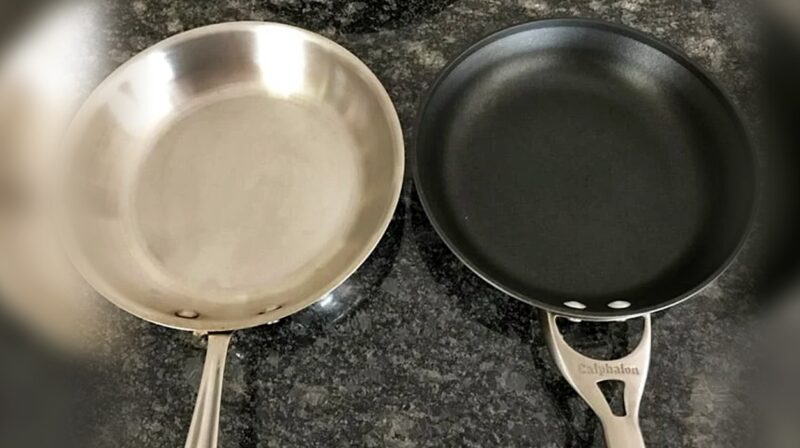
If you prefer to avoid aluminum cookware altogether, there are plenty of non-reactive alternatives available. Stainless steel, cast iron, ceramic, and glass cookware are excellent choices for cooking acidic or salty dishes.
These materials do not react with the food, ensuring that no unwanted substances are transferred during the cooking process.
Each alternative material has its own unique properties and benefits. Stainless steel is durable and easy to clean, while cast iron offers excellent heat retention. Ceramic and glass cookware are non-stick and great for slow, gentle cooking.
Consider your cooking preferences and needs when selecting the right non-reactive cookware for your kitchen.
| Cookware Material | Properties |
|---|---|
| Stainless Steel | Durable, easy to clean |
| Cast Iron | Excellent heat retention |
| Ceramic | Non-stick, great for slow cooking |
| Glass | Non-reactive, versatile |
By following these precautions and exploring non-reactive cookware alternatives, you can make informed choices about your cookware and reduce potential health concerns associated with aluminum pans. Remember, the key is to ensure the safety of your cookware and minimize the transfer of unwanted substances into your food.
Benefits and Care of Aluminum Cookware
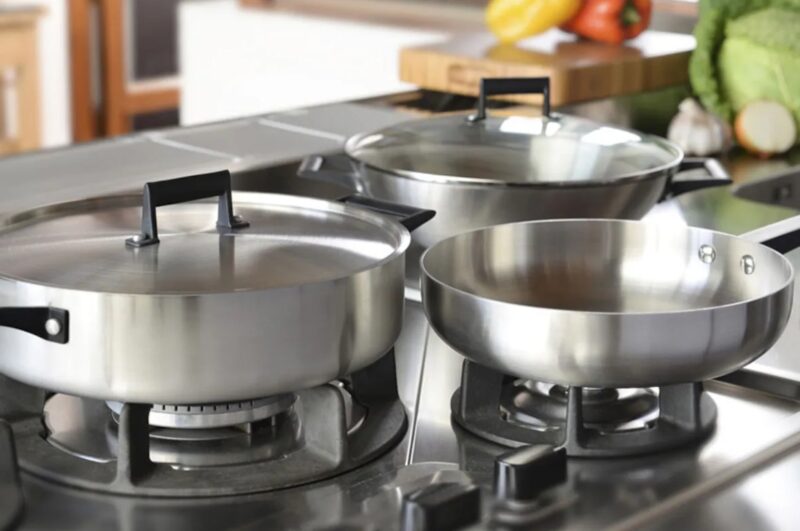
Aluminum cookware offers a range of benefits that make it a popular choice among home cooks. One of its standout features is excellent heat conduction, which ensures that your food cooks evenly and quickly.
This can save you precious time in the kitchen and help you achieve consistent results with your recipes. Additionally, aluminum cookware is lightweight, making it easy to handle and maneuver while cooking. Its lightweight nature also makes it a breeze to clean and store, minimizing the hassle of heavy pots and pans.
When it comes to caring for your aluminum cookware, it’s important to follow a few simple guidelines. Hand washing with mild dish soap and a non-abrasive sponge or cloth is the best way to maintain the integrity of the aluminum surface.
Avoid cleaning your aluminum cookware in the dishwasher, as the harsh detergents and high heat can cause damage. Furthermore, it’s advisable to store acidic foods in alternative containers rather than in aluminum cookware, as acidic ingredients can react with the metal.
Using non-metal utensils when cooking with aluminum pans can also help prolong their lifespan. Metal utensils can scratch the surface of the cookware, potentially exposing the underlying aluminum layer.
By using wooden, silicone, or other non-metal utensils, you can prevent scratches and maintain the non-stick properties of your aluminum cookware.
In summary, aluminum cookware comes with a range of benefits, including excellent heat conduction, lightweight design, and affordability.
By following the recommended care guidelines and using non-reactive utensils, you can ensure the longevity of your aluminum cookware and continue to enjoy its many advantages in the kitchen.
Conclusion
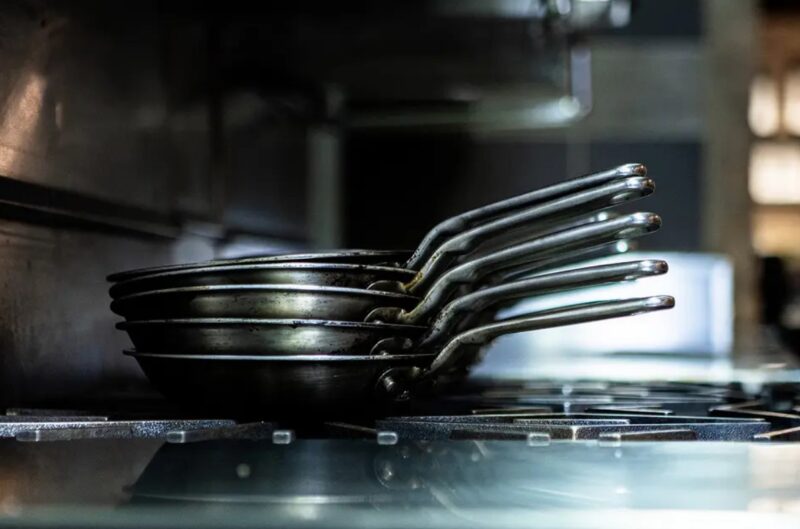
In conclusion, it’s important to separate facts from fiction when it comes to the safety of aluminum cookware. While there are concerns about potential aluminum leaching and its interaction with certain foods, scientific research has not found a direct link between aluminum cookware and health conditions like Alzheimer’s.
It’s crucial to rely on accurate information and make informed decisions.
Taking precautions and responsibly using aluminum cookware can help minimize any potential risks. Factors such as the condition of the cookware, the type of food being cooked, and the cooking methods used all play a role in ensuring safety.
By cooking acidic or salty meals for a short period, using high-quality, undamaged cookware, and avoiding abrasive cleaners, you can help reduce aluminum leaching.
However, for those who prefer to avoid aluminum altogether, there are alternative cookware options available. Stainless steel, cast iron, ceramic, and glass are non-reactive materials that offer similar cooking performance without the potential health concerns associated with aluminum cookware.
Ultimately, the choice of cookware material is a personal decision based on individual preferences and priorities. By staying informed and following recommended guidelines, you can confidently make choices that suit your needs and ensure a safe and enjoyable cooking experience.
FAQ
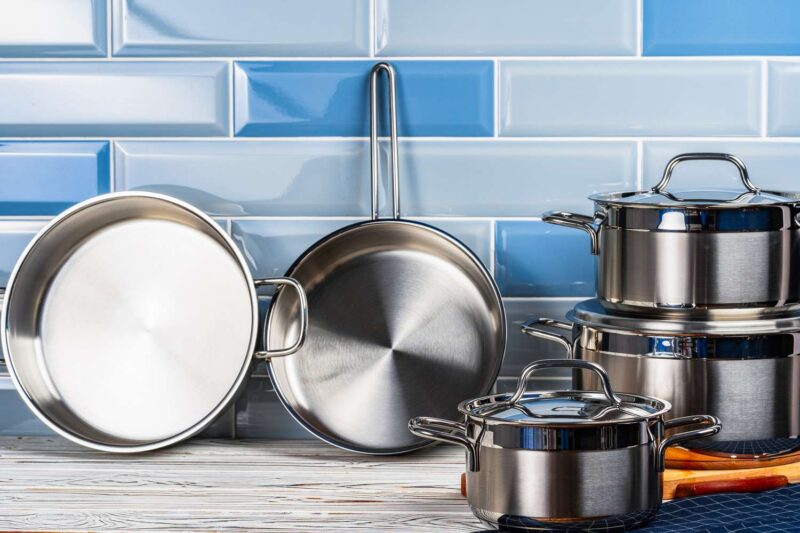
Are aluminum pans safe to use?
Aluminum pans are considered safe for use in cookware. However, there are concerns about potential interaction with certain foods and the release of aluminum into the food during cooking.
Should I be worried about the health risks of using aluminum cookware?
While excessive aluminum intake has been linked to health issues such as Alzheimer’s, kidney, and bone disorders, the aluminum content in most foods is generally low, and the body can handle small amounts of aluminum without significant harm.
The scientific community has not agreed on a direct link between aluminum cookware and these health conditions. It is advisable to take precautions to minimize aluminum leaching.
What precautions can I take to minimize the potential health risks of aluminum cookware?
To lessen the risk of aluminum affecting food, it is recommended to cook acidic or salty meals for a short period in aluminum cookware. Using high-quality, undamaged cookware and avoiding abrasive cleaners can also help reduce aluminum leaching.
Non-reactive cookware alternatives, such as stainless steel, cast iron, ceramic, and glass, can be used for acidic or salty dishes.
What are the benefits of using aluminum cookware?
Aluminum cookware offers excellent heat conduction, lightweight nature, affordability, and non-stick options. It heats up quickly and evenly, reducing cooking time and ensuring even heat distribution. It is also lightweight, making it easy to handle in the kitchen.
How should I care for aluminum cookware?
To care for aluminum cookware, it is recommended to hand wash it with mild dish soap and a non-abrasive sponge or cloth. Avoid cleaning in the dishwasher, storing acidic foods, and using metal utensils that can scratch the surface.

